In today's competitive market, a simple contact list or a jumbled spreadsheet is no longer sufficient for managing customer relationships and driving growth. This is where Customer Relationship Management (CRM) software becomes an indispensable asset for any modern sales team. A robust CRM tool transforms scattered data into a centralized, actionable hub, empowering your team to track every interaction, manage sales pipelines efficiently, and nurture leads from first contact to a closed deal. This comprehensive guide moves beyond surface-level descriptions to provide a deep dive into the best sales CRM software available.
We will explore the core functions of a sales CRM, detailing its transformative benefits and outlining a clear framework for how to choose the right CRM software solution for your specific business needs. Beyond traditional contact management, modern sales teams are increasingly leveraging innovations like AI CRM, the next generation of Customer Relationship Management to automate tasks and gain predictive insights. Our analysis covers top-tier CRM platforms, from industry giants like Salesforce to specialized sales crm tools like Pipedrive.
This listicle is designed to be your go-to resource for finding the best sale software for your team. Each entry includes:
- A concise overview of its key strengths.
- An honest look at potential limitations.
- Practical use-case scenarios.
- Helpful screenshots and direct links to explore further.
Let's find the sales management software that will streamline your process, boost your team's productivity, and ultimately supercharge your revenue growth.
What is CRM Software for Sales?
CRM software for sales, often called a sales CRM, is a specialized technology designed to manage and optimize all interactions and relationships with current and potential customers. At its core, it's a centralized database where a crm software for sales team can store contact information, track communication history (emails, calls, meetings), and monitor where each lead is in the sales pipeline. However, modern sales crm platforms go far beyond simple contact management. The best CRM for sales reps acts as a comprehensive sales software, automating repetitive tasks, providing deep analytics on sales performance, and offering predictive insights to help salespeople prioritize their efforts. Ultimately, these crm tools for sales empower teams to build stronger relationships, shorten sales cycles, and close more deals. A good CRM system for sales is the backbone of any effective sales strategy.
Benefits of Using a Sales CRM Software
Adopting a sales CRM software is more than just a technological upgrade; it's a strategic move that delivers tangible benefits across the entire sales organization. A well-implemented crm solution can revolutionize how your team operates, leading to significant improvements in efficiency, collaboration, and revenue.
- Centralized Customer Data: All contact information, interaction history, and notes are stored in one accessible location, giving every team member a complete 360-degree view of the customer.
- Improved Sales Pipeline Management: Visual pipelines in the best sales crms allow teams to track deals at every stage, identify bottlenecks, and forecast revenue with greater accuracy.
- Enhanced Productivity through Automation: CRM and sales software automates routine tasks like data entry, follow-up reminders, and email scheduling, freeing up salespeople to focus on what they do best: selling.
- Data-Driven Decision Making: Robust reporting and analytics features provide deep insights into sales performance, customer behavior, and team productivity, enabling leaders to make informed strategic decisions.
- Better Customer Relationships: By tracking every interaction, a sales crm system helps reps personalize communication and build stronger, long-lasting relationships with clients.
- Seamless Team Collaboration: Simple crm tools ensure that all team members are on the same page, sharing information and collaborating effectively on deals, which is crucial for complex sales cycles.
Top 15 Sales CRM Software
Here's our breakdown of the top sales CRM solutions and crm software platforms on the market today. Whether you need an enterprise-grade platform or simple crm tools, this list covers the crm software best suited for various needs.
1. Salesforce Sales Cloud
Salesforce Sales Cloud is often considered the industry standard for CRM software, establishing a high bar with its comprehensive, enterprise-grade platform. It’s a full-stack solution designed to manage every aspect of the sales cycle, from lead generation and pipeline management to complex forecasting and analytics. Its core strength lies in its unparalleled customizability and scalability, making it an ideal choice for large organizations with unique workflows and integration needs.
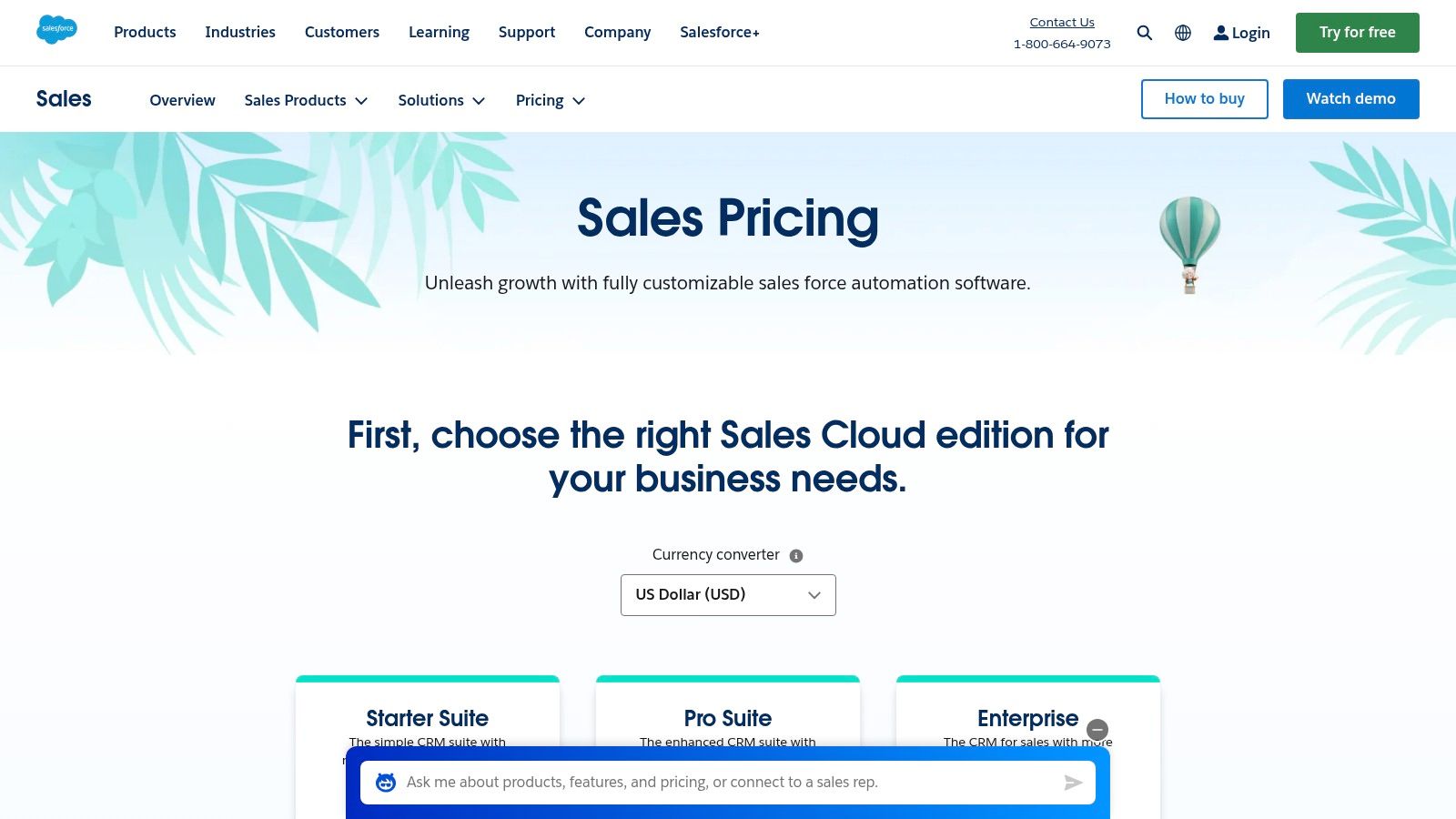
This CRM platform excels at providing a 360-degree view of the customer. Teams can track interactions, manage opportunities, and automate routine tasks to focus on closing deals. For businesses aiming to maximize efficiency, exploring various Salesforce automation tips can unlock significant productivity gains. Furthermore, its massive AppExchange marketplace allows for near-limitless extension of its capabilities, integrating with thousands of third-party applications. This makes Salesforce one of the most powerful sales crm platforms available and arguably the best crm system for large enterprises.
Core Features & Limitations
Pros:
- Highly Extensible: Its robust API and the AppExchange marketplace provide endless customization.
- Advanced Analytics: Powerful reporting and forecasting tools give deep insights into sales performance.
- Mature Ecosystem: Benefits from a large community, extensive documentation, and a vast network of certified administrators.
Cons:
- High Cost: Pricing can become prohibitive for smaller businesses, especially as you add users and advanced features.
- Steep Learning Curve: The platform's complexity often requires a dedicated administrator or specialized training to manage effectively.
While it is a dominant player, you can explore other powerful options in our guide to the best sales CRM software.
Website: https://www.salesforce.com/sales/pricing/
2. HubSpot CRM (Sales Hub)
HubSpot CRM is renowned for its powerful free tools and user-friendly interface, making it an exceptional starting point for small to mid-sized businesses. It’s designed as an all-in-one platform, seamlessly integrating sales, marketing, and service functions to create a unified customer view. The platform’s core strength is its accessibility and scalability, allowing teams to adopt a robust CRM software for sale teams without a significant initial investment or steep learning curve.
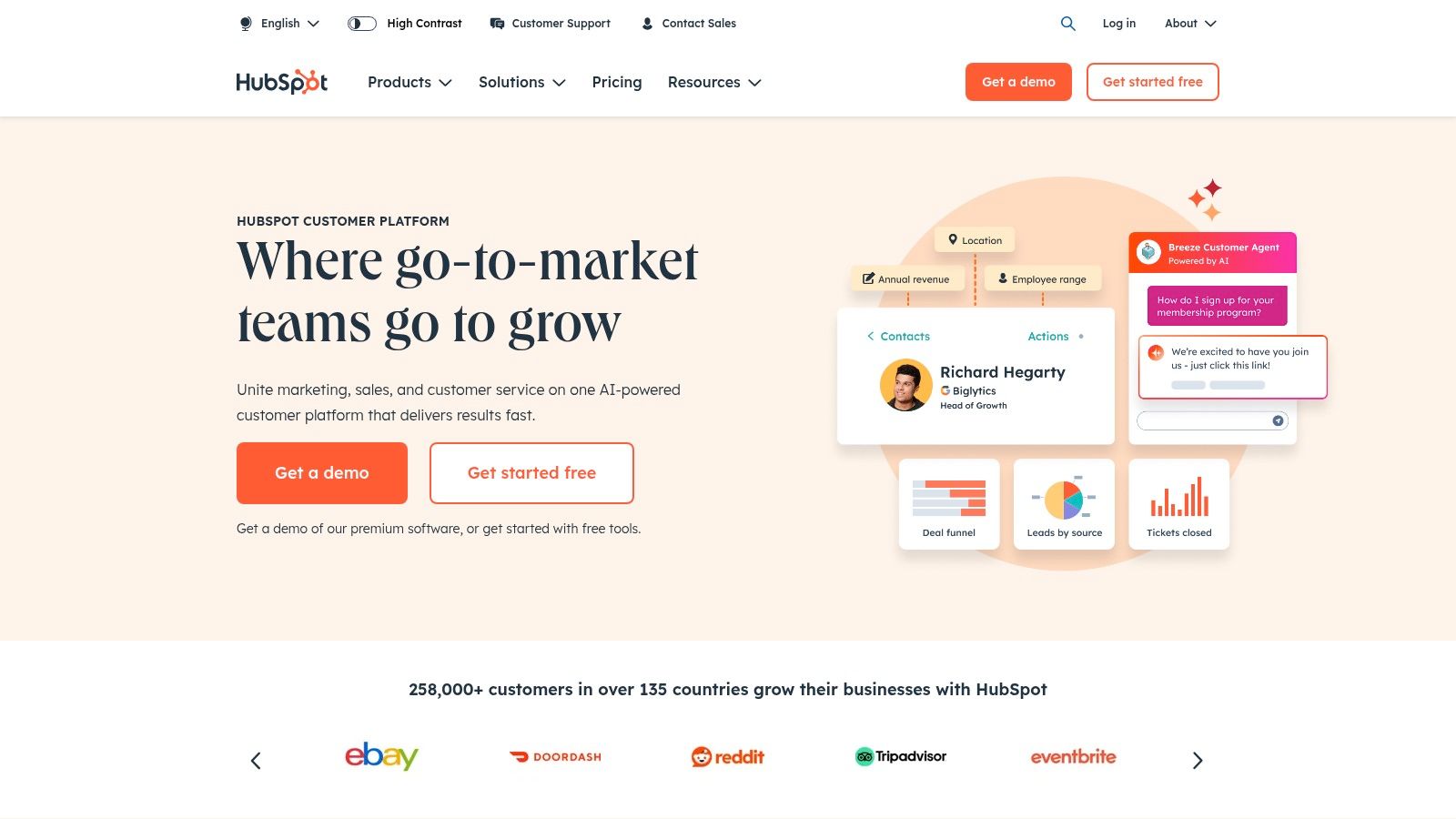
This crm tool excels at streamlining the entire sales process, from contact management and email tracking to pipeline visualization and meeting scheduling. For growing teams, its powerful automation and sequences in higher tiers help nurture leads and close deals more efficiently. The platform is built around the concept of inbound marketing and sales, providing extensive educational resources and templates to help users succeed. You can further enhance its functionality with a wide variety of available HubSpot integrations.
Core Features & Limitations
Pros:
- User-Friendly: An intuitive interface allows for quick adoption and fast deployment with minimal training.
- Excellent Free Tier: Offers a generous suite of free tools, making it one of the best sales CRM software options for startups.
- Strong Native Alignment: Tightly integrates marketing, sales, and service hubs for a cohesive customer experience.
Cons:
- Gets Pricey: Advanced sales and automation features are locked behind the more expensive Professional and Enterprise tiers.
- Onboarding Fees: Higher-tier plans often require a mandatory, paid onboarding process.
Website: https://www.hubspot.com/
3. Microsoft Dynamics 365 Sales
Microsoft Dynamics 365 Sales is a formidable crm software solution, especially for organizations already embedded within the Microsoft ecosystem. It’s designed to unify sales processes by providing deep, native integrations with familiar tools like Microsoft 365, Outlook, and Teams. This CRM platform focuses on streamlining the seller workflow, allowing teams to manage leads, track opportunities, and engage with customers without constantly switching applications. Its core value proposition is leveraging existing Microsoft investments to create a cohesive and intelligent sales environment.
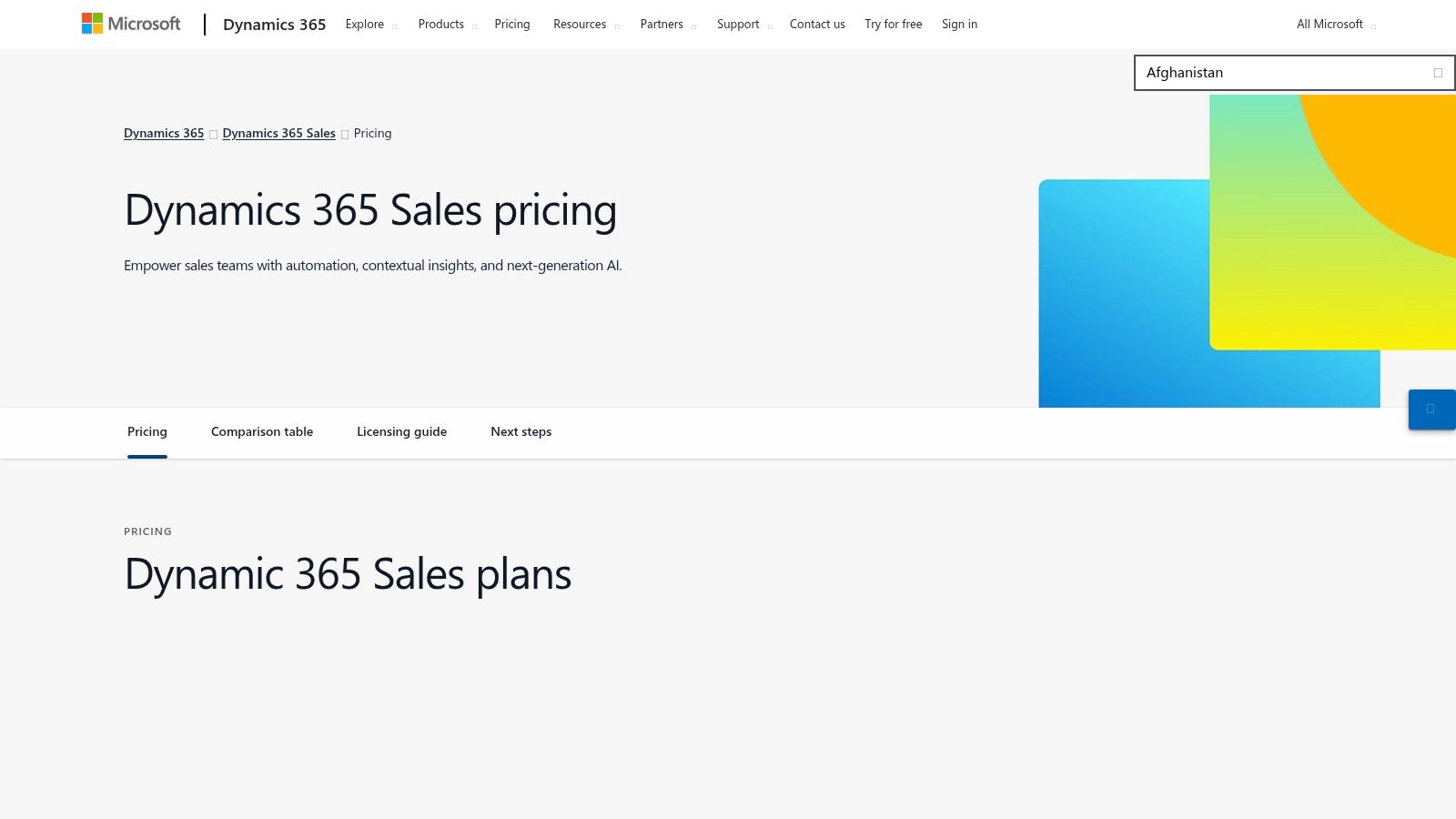
This crm tool software excels by infusing AI capabilities, like its built-in Copilot, directly into the sales cycle to offer predictive insights, automate email drafting, and summarize meetings. A key differentiator is its Relationship Sales bundle, which integrates LinkedIn Sales Navigator to build a comprehensive view of professional networks and relationships. For businesses seeking a powerful sales management software that harmonizes with their existing IT infrastructure, Dynamics 365 presents a compelling case. To understand how it fits into the broader landscape, you can explore the fundamentals of what constitutes a modern CRM system.
Core Features & Limitations
Pros:
- Deep Microsoft Integration: Seamless interoperability with Microsoft 365, Teams, and Power BI creates a unified user experience.
- Powerful AI Capabilities: Copilot assists with task automation, content creation, and data-driven insights.
- Flexible Deployment: Can be implemented as a standalone sales CRM or as part of the broader Dynamics 365 suite of business applications.
Cons:
- Complex Licensing: The pricing structure and different tiers can be confusing to navigate without careful planning.
- Best in Microsoft Stack: To unlock its full potential, a significant investment in the wider Microsoft ecosystem is often necessary.
Website: https://www.microsoft.com/en/dynamics-365/products/sales/pricing
4. Zoho CRM
Zoho CRM carves out a significant space in the market by offering a powerful, feature-rich platform at an extremely competitive price point. It is designed to serve businesses of all sizes, from solo entrepreneurs to mid-market companies, providing a comprehensive suite of tools for sales, marketing, and customer support. The platform’s strength lies in its balance of advanced functionality, like AI-powered assistance and deep customization, with an affordable pricing model that delivers exceptional value.

This sales crm platform equips sales teams with tools like multiple pipeline management, workflow automation, and sophisticated process blueprints to standardize sales operations. Its built-in AI assistant, Zia, offers predictive analytics, suggests the best times to contact leads, and helps identify anomalies in sales trends. For businesses that need to track performance metrics closely, Zoho provides robust analytics, and you can learn how to leverage these tools in our guide on creating insightful CRM reports. This combination of affordability and power makes Zoho CRM a compelling choice for growing teams.
Core Features & Limitations
Pros:
- Very Competitive Pricing: Offers a free plan and affordable paid tiers that provide significant value.
- Broad Suite Options: Integrates seamlessly with the extensive Zoho One ecosystem of business apps.
- Good Coverage for SMB to Midmarket: Scales effectively to meet the needs of growing businesses.
Cons:
- UI Can Feel Busy: The interface can be overwhelming for new users due to the sheer number of features.
- Advanced Features Tiered: Many of the most powerful tools, like advanced analytics and customization, are reserved for higher-priced plans.
Website: https://www.zoho.com/crm/pricing/
5. Pipedrive
Pipedrive is a sales-first crm software built by salespeople, for salespeople. Its primary strength is an exceptionally intuitive, visual interface centered around a sales pipeline. This design makes it easy for small to mid-sized businesses (SMBs) to track deals, identify bottlenecks, and focus their efforts on activities that drive revenue. It’s a powerful CRM tool for teams that prioritize a straightforward, activity-based selling approach.
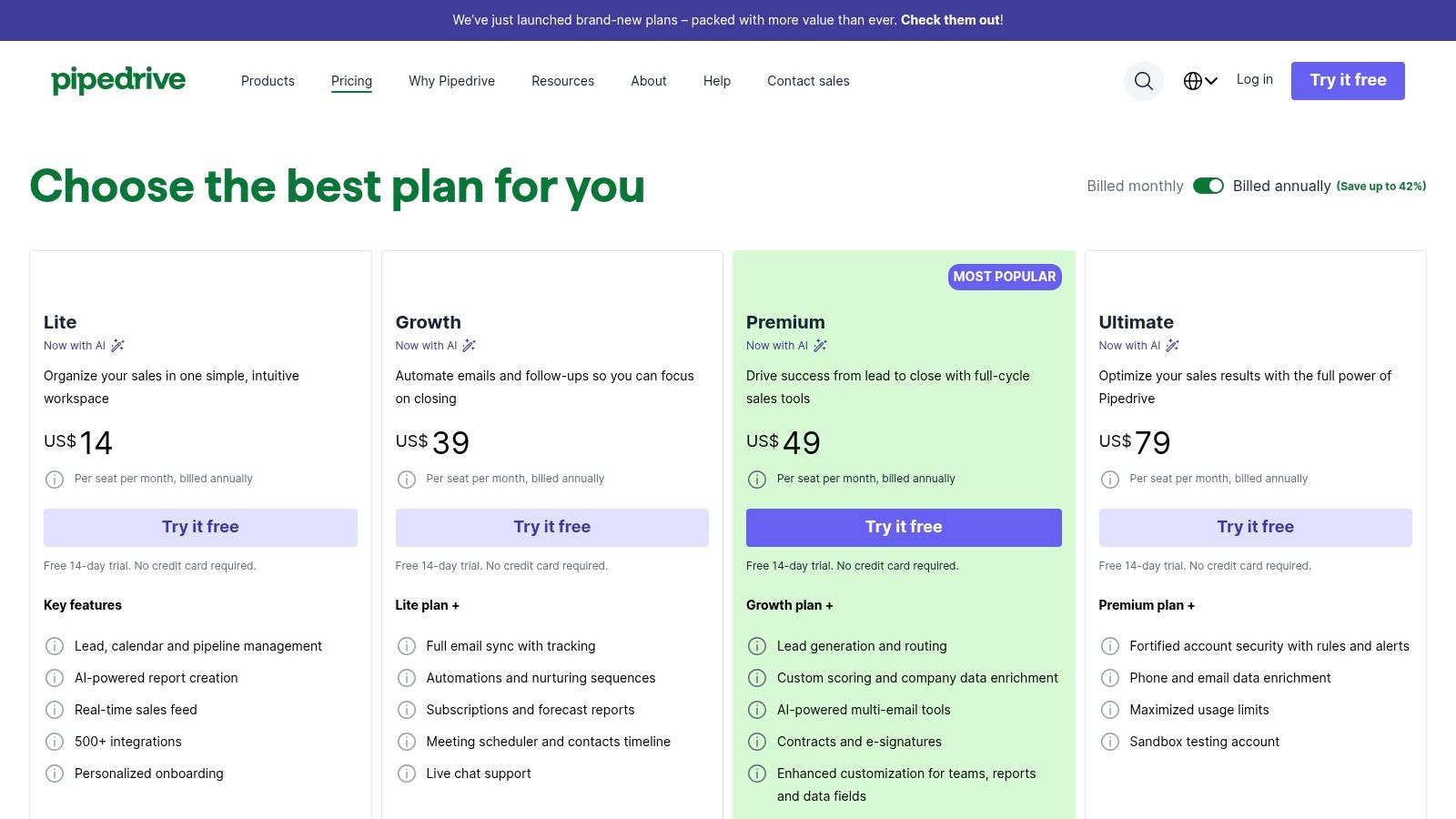
The platform empowers teams to manage their sales process with drag-and-drop simplicity, automating follow-ups and synchronizing emails to keep all communications in one place. Pipedrive also offers AI-assisted tools to help with reporting and optimizing email sends. With over 500 integrations available, it can connect to the other tools in your stack. For those looking to fully leverage this connectivity, understanding the possibilities of Pipedrive integration can significantly enhance your team's workflow and data synchronization capabilities.
Core Features & Limitations
Pros:
- Very Easy to Learn and Use: The visual pipeline and intuitive design ensure rapid team adoption with minimal training.
- Strong Fit for Outbound Sales: Built around activity-based selling, making it ideal for teams focused on proactive outreach.
- Transparent Pricing: Clear, per-user pricing plans with valuable add-ons like LeadBooster and Campaigns.
Cons:
- Limited Native Marketing: Lacks the built-in, comprehensive marketing automation found in all-in-one CRM platforms.
- Advanced Reporting on Higher Tiers: The most insightful analytics and reporting features are reserved for more expensive plans.
Website: https://www.pipedrive.com/en/pricing
6. Freshsales by Freshworks
Freshsales, part of the Freshworks ecosystem, is a modern crm software solution designed for speed and simplicity, targeting small to mid-market businesses. Its standout feature is the integration of multichannel communication tools directly into the platform. This allows sales teams to engage with prospects and customers via phone, email, chat, and SMS from a single, unified interface, eliminating the need to switch between different applications. It is an excellent telesales crm software.
The platform is powered by an AI assistant, Freddy AI, which automates lead scoring, provides predictive deal insights, and helps forecast sales with greater accuracy. This focus on built-in intelligence and communication makes it one of the most efficient sales crm tools for teams that need to move fast. With a clean, intuitive user interface, Freshsales offers a quick setup process, allowing businesses to get up and running without extensive training or dedicated administrators. The Freshsales Suite option further enhances its value by combining sales and marketing automation into one cohesive package.
Core Features & Limitations
Pros:
- Strong Value: Built-in communication channels provide excellent functionality without third-party costs.
- Fast Setup: The user-friendly interface is ideal for SMB and mid-market teams needing a quick deployment.
- Free Plan Available: Offers a generous free tier for up to three users, making it accessible for startups.
Cons:
- Gated Advanced Features: Many powerful capabilities are reserved for the more expensive higher-tier plans.
- Smaller Ecosystem: Its third-party app marketplace is less extensive compared to industry leaders.
Website: https://www.freshworks.com/crm/pricing/
7. monday Sales CRM
monday Sales CRM leverages the highly visual and flexible framework of the monday.com Work OS to deliver a CRM tool that is both powerful and remarkably easy to adapt. It stands out by allowing teams to build and customize their sales pipelines, dashboards, and workflows using intuitive, no-code building blocks. This approach makes it a fantastic choice for businesses that need a CRM software solution tailored to their unique sales process without requiring technical expertise or a dedicated administrator.

The platform is built for clarity and collaboration, enabling sales teams to manage unlimited contacts and pipelines while integrating seamlessly with tools like Gmail and Outlook. Its strength lies in automation; users can set up triggers and actions for everything from lead assignment to follow-up reminders, freeing up time for selling. For teams needing a centralized hub that connects sales with other departments like marketing or project management, this CRM software provides a unified and collaborative workspace that other dedicated CRM platforms often lack.
Core Features & Limitations
Pros:
- Highly Configurable: No-code workflows and customizable boards allow for easy adaptation to any sales process.
- Clean User Interface: The visual and intuitive design promotes quick user adoption and cross-team collaboration.
- Strong Automations: Powerful, easy-to-set-up automations handle routine tasks and streamline the sales cycle.
Cons:
- Seat Pack Pricing: Plans are structured by minimum seat packs (e.g., 3, 5), which can be costly for very small teams.
- Advanced Features Gated: Key sales-specific tools like sales forecasting are reserved for higher-tier Pro and Enterprise plans.
Website: https://monday.com/crm/pricing/
8. Copper
Copper is the go-to CRM software for businesses deeply embedded in the Google Workspace ecosystem. It differentiates itself by integrating directly into Gmail, Google Calendar, and Google Drive, essentially living where your team already works. This native integration eliminates the need for manual data entry, as it automatically captures contacts, emails, and meeting details, making it one of the most user-friendly CRM platforms for Google-centric teams. Its primary strength is its simplicity and seamless workflow automation within a familiar environment.

The platform is designed to be intuitive from the start, significantly reducing the typical onboarding time associated with new crm-tools. Teams can manage sales pipelines, automate tasks, and track project progress without ever leaving their inbox. For organizations that rely heavily on Google for day-to-day operations, Copper acts as a natural extension of their existing tools, turning their communication hub into a powerful sales crm. This makes it a top crm software solution for small to mid-sized businesses looking for efficiency and ease of use.
Core Features & Limitations
Pros:
- Best-in-class Google Integration: Lives inside Gmail, offering a truly native experience.
- Intuitive User Experience: Extremely easy to learn and adopt, requiring minimal training.
- Clear and Straightforward Plans: Simple pricing tiers make it easy to choose the right option.
Cons:
- Contact Limits on Lower Tiers: The Basic and Professional plans have limitations on the number of contacts you can store.
- Less Suited for Complex Needs: May lack the advanced customization and feature depth required by large enterprises.
Website: https://www.copper.com/pricing
9. Insightly
Insightly positions itself as a unified CRM platform designed for businesses scaling their Revenue Operations (RevOps). It bundles sales, marketing, and service functionalities into a single, cohesive system, providing a holistic view of the customer journey. Its key differentiator is the depth of its customization capabilities, which allow businesses to tailor the platform to their specific workflows without requiring extensive developer resources. This makes it an excellent choice for enterprises needing strong governance and reporting across departments.
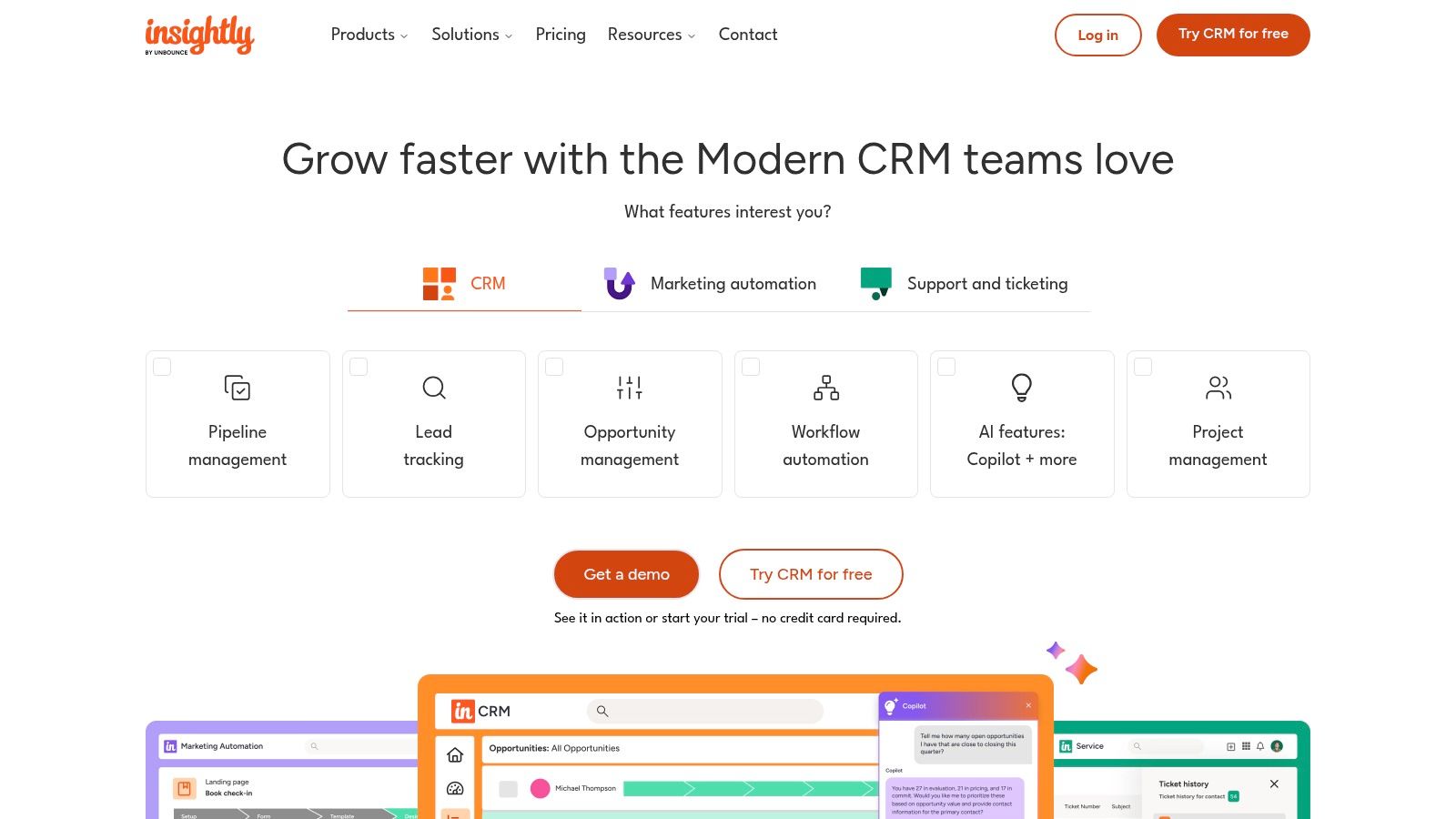
This CRM software and tools package lets users create custom objects, fields, and page layouts, ensuring the system aligns perfectly with their operational processes. Features like AI-driven email replies and robust, role-based permissions help teams maintain efficiency and data security. By integrating sales, marketing, and service data, Insightly provides powerful dashboards and analytics that support strategic decision-making. For any business looking to streamline its sales crm and align its revenue-generating teams, Insightly offers a powerful, all-in-one solution.
Core Features & Limitations
Pros:
- Strong Customization: Highly adaptable without heavy reliance on developers, allowing for custom objects and layouts.
- Unified Platform: Supports a complete Revenue Operations strategy by integrating sales, marketing, and service tools.
- Robust Reporting: Offers advanced dashboards and analytics for deep insights into business performance.
Cons:
- Annual Commitment: Bundled pricing plans often require an annual contract along with onboarding and support fees.
- Higher Entry Costs: The initial investment can be higher compared to more basic or modular CRM tools.
Website: https://www.insightly.com/
10. SugarCRM (Sugar Sell)
SugarCRM offers a flexible and AI-driven CRM software solution designed for mid-market and enterprise businesses seeking deep customization and control over their sales processes. Its platform, Sugar Sell, is engineered to provide a clear picture of the customer journey with powerful revenue intelligence and forecasting capabilities. A key differentiator is its commitment to deployment flexibility, allowing businesses to host on-premises, in a private cloud, or through SugarCRM's cloud environment.

This CRM platform excels at intelligent account management, equipping sales teams with the tools needed to understand customer health and identify opportunities. Sugar Sell integrates essential sales engagement features, including mail and calendar integration, case management, and AI-powered guidance. For businesses utilizing cloud marketplaces, SugarCRM is also available via AWS Marketplace, which can streamline procurement and billing. Its extensibility through connectors for SharePoint, Google Workspace, and DocuSign ensures it can fit into complex existing tech stacks, making it a robust sales crm software choice.
Core Features & Limitations
Pros:
- Strong Customization: Offers deep customization capabilities and powerful analytics for tailored insights.
- Multiple Deployment Options: Provides flexibility with on-premises, cloud, and hybrid hosting, plus AWS Marketplace availability.
- Competitive TCO: Delivers a competitive total cost of ownership for its target mid-market and enterprise audience.
Cons:
- User Minimums: Several editions require a minimum number of users, which may be a barrier for smaller teams.
- Tiered Feature Access: The most advanced features, like predictive forecasting, are reserved for higher-priced plans.
Website: https://www.sugarcrm.com/pricing/
11. Liondesk (Lionshare CRM)
Liondesk, often referred to as Lionshare CRM, is a specialized CRM for sale professionals, particularly those in the real estate and mortgage industries. Its strength lies in its lead generation and communication automation features tailored for high-volume outreach. The platform includes a power dialer, text message marketing, and "AI-powered lead follow-up" to nurture prospects automatically, making it an excellent software for salespeople who manage a large database of contacts.
Core Features & Limitations
Pros:
- Industry-Specific: Built with features like transaction management that cater directly to real estate agents and brokers.
- Powerful Communication Tools: Integrates power dialing, bulk texting, and video emails to engage leads at scale.
- Lead Nurturing Automation: The "Lead Assist AI" can handle initial lead conversations, qualifying prospects before handing them off to an agent.
Cons:
- Niche Focus: While powerful for its target industries, it may lack the general-purpose flexibility needed by other B2B sales teams.
- UI Can Be Cluttered: Some users find the interface less modern and intuitive compared to mainstream sales crms.
12. G2 — CRM Software Category
While not a CRM platform itself, G2's CRM Software category is an indispensable resource for anyone in the market for a new system. It functions as a comprehensive, real-time marketplace and review hub, allowing businesses to research, compare, and shortlist potential CRM tools based on verified user feedback. Its power lies in aggregating thousands of reviews and data points into easy-to-digest formats like its proprietary Grid rankings, which plot vendors by market presence and user satisfaction.
This platform enables teams to filter the vast landscape of CRM software by specific features, company size, pricing models, and industry focus. Users can conduct side-by-side comparisons of different sales crm platforms, read detailed buyer guides, and gain insights from authentic reviews written by peers. For sales teams evaluating different crm tools for sales, G2 provides a transparent and data-driven approach to decision-making, cutting through marketing jargon to reveal how these systems perform in real-world scenarios. It’s an essential first stop for building a shortlist of the best sales crms.
Core Features & Limitations
Pros:
- Broad Market Coverage: Features an extensive and up-to-date directory of nearly every crm software solution available.
- Verified User Reviews: Provides authentic, real-world insights from a massive community of actual users.
- Powerful Filtering: Allows for granular searches based on features, company size, and user satisfaction ratings to find the right fit.
Cons:
- Promoted Placements: Vendor advertising can influence the visibility of certain tools, potentially skewing initial search results.
- Pricing Inconsistencies: The pricing information listed may not always be current or reflect the vendor's official website.
Website: https://www.g2.com/categories/crm
13. AWS Marketplace — CRM Listings
For organizations deeply integrated into the Amazon Web Services ecosystem, the AWS Marketplace offers a streamlined and centralized way to procure and deploy CRM software. Rather than being a single CRM platform itself, it acts as a digital catalog where businesses can discover, purchase, and launch various CRM solutions, including popular options like SugarCRM and Freshsales. Its primary strength lies in simplifying the procurement process for IT and procurement teams by consolidating billing and governance under the existing AWS account.
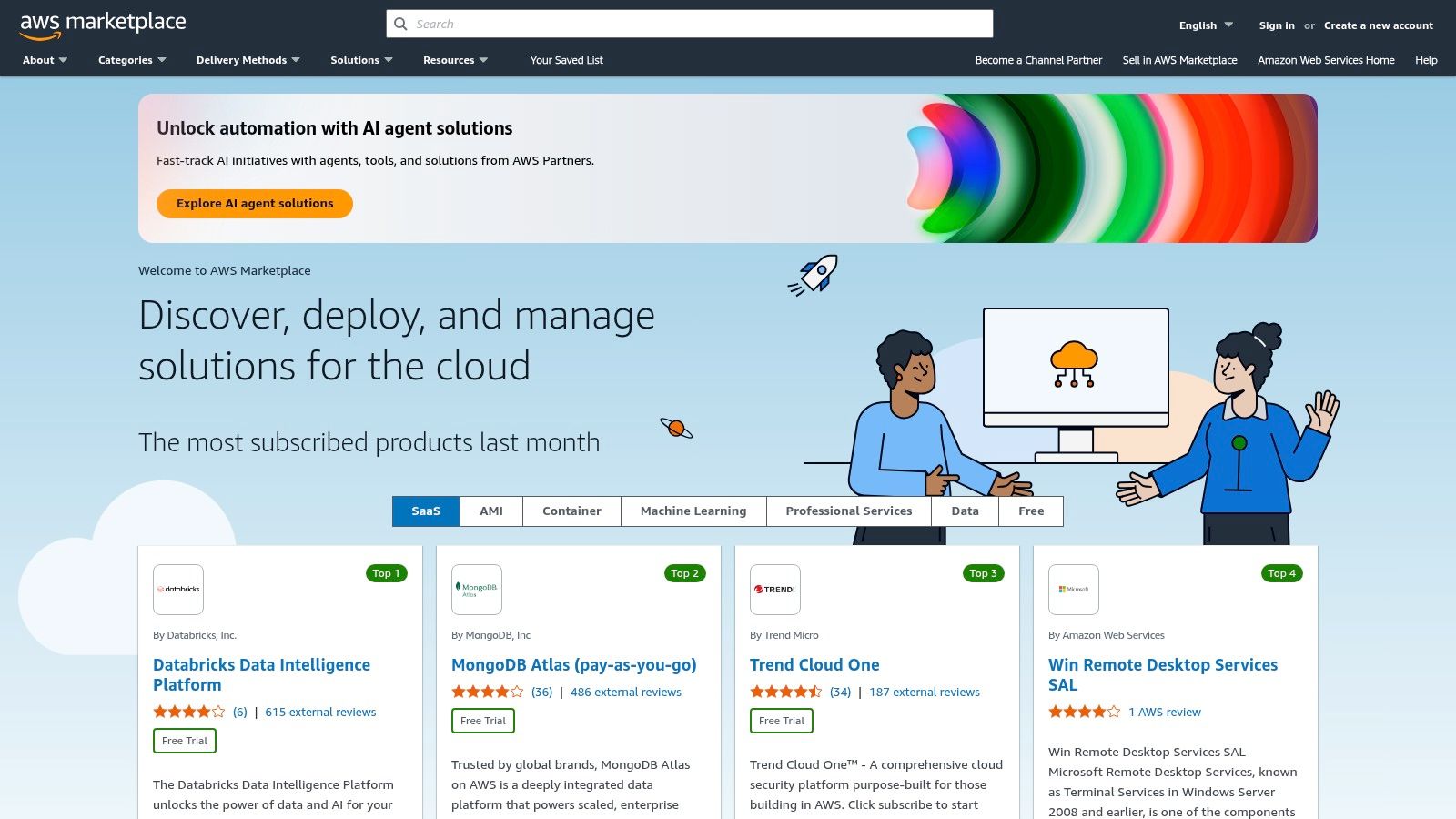
This approach is particularly beneficial for enterprises aiming to standardize their software stack and manage costs efficiently. Teams can leverage their existing AWS agreements, use private offers for customized pricing, and often find trial versions to test a CRM tool before committing. For businesses looking to buy crm software that can be easily managed alongside their cloud infrastructure, the marketplace provides a unique, integrated purchasing experience. This makes it a strategic choice for tech-savvy companies that prioritize governance and consolidated vendor management.
Core Features & Limitations
Pros:
- Centralized Billing: Consolidates CRM software costs into your existing AWS bill for simplified accounting.
- Enterprise-Friendly Procurement: Supports private offers, customized terms, and purchase orders, ideal for large organizations.
- Streamlined Deployment: Facilitates faster provisioning of CRM solutions directly within the AWS environment.
Cons:
- Vendor-Dependent Catalog: The selection is limited to CRM providers that have chosen to list their products on the marketplace.
- Niche Audience: Best suited for companies already utilizing AWS infrastructure; less practical for those outside the ecosystem.
Website: https://aws.amazon.com/marketplace
14. NetSuite CRM
NetSuite CRM is part of Oracle's broader suite of business management software, offering a powerful, all-in-one platform that connects sales with marketing, service, and even e-commerce and ERP functions. Its key strength is providing a true, unified view of the customer across their entire lifecycle, from lead to order to post-sale support. This makes it one of the best sales crms for businesses that need to manage complex sales cycles that involve quoting, order management, and commissions.
Core Features & Limitations
Pros:
- True 360-Degree Customer View: Seamlessly integrates sales data with financials, inventory, and support information.
- Advanced Sales Force Automation (SFA): Includes robust tools for forecasting, commission management, and partner relationship management.
- Scalability: Built to handle the complex needs of growing mid-market and enterprise companies.
Cons:
- High Cost and Complexity: Can be expensive and require significant implementation resources.
- Steep Learning Curve: The extensive feature set can be overwhelming for teams needing a simpler solution.
15. Keap (formerly Infusionsoft)
Keap is a CRM software and tools platform designed specifically for small businesses and entrepreneurs. It combines sales and marketing automation with a user-friendly CRM, making it an excellent choice for businesses looking to systematize their lead capture and follow-up processes. Its "Easy Automations" feature allows users to build sophisticated nurturing campaigns without needing technical expertise, a key differentiator among simple crm tools.
Core Features & Limitations
Pros:
- Excellent for Small Business: Tailored features like appointment scheduling and invoicing are built-in.
- Powerful Automation: Strong capabilities for creating automated marketing and sales follow-up sequences.
- All-in-One Solution: Combines CRM, email marketing, and landing pages in one platform.
Cons:
- Pricing: Can be more expensive than other small business CRMs, especially for users with large contact lists.
- Can Be Overkill: The extensive automation features might be too complex for businesses with very simple sales processes.
How to Choose Your Sales CRM Software
Navigating the vast landscape of CRM software can feel overwhelming, but making an informed decision is a foundational step toward unlocking significant sales growth and operational efficiency. The central takeaway is clear: the "best" sales crm is not a one-size-fits-all label. The right choice is deeply personal to your business, contingent on your unique sales process, team size, and growth ambitions. Before you decide to buy crm software, consider your specific needs. The most effective crm lösung (German for CRM solution) or CRM tools software will act as a central nervous system for your sales operations, not just a digital rolodex.
A Practical Framework for Your Final Decision
To move from analysis to action, it's crucial to adopt a strategic selection process. Don't get distracted by flashy features you'll never use. Instead, ground your evaluation in the practical realities of your day-to-day operations and future goals.
Map Your Process First: Before you even look at a demo, sit down and map out your entire sales cycle from lead acquisition to a closed deal. Identify each stage, the key activities involved, and where your team currently faces the most friction. This map becomes your blueprint for evaluating which sales crm systems can best support and optimize your existing workflow. A CRM solution should fit your process, not the other way around.
Prioritize Core Needs Over "Nice-to-Haves": Create a checklist of non-negotiable features. Does your team live on the phone? Then built-in calling and logging are critical. Is your sales cycle complex and long? Advanced forecasting and reporting tools are a must. This focused list of requirements will help you cut through the marketing noise and compare crm-tools on the factors that truly matter to your bottom line.
Think About Tomorrow's Business: Your chosen CRM software solution needs to support you not just today, but in one, three, or five years. Investigate the scalability of your top contenders. How easily can you add new users? Do they offer more advanced plans with features you might need down the line? A platform that can grow with you prevents the costly and disruptive process of migrating to a new system later.
Evaluate the Ecosystem: No tool operates in a vacuum. Your CRM must connect seamlessly with the other software that runs your business, like your email marketing platform, customer support desk, and accounting software. When selecting the ideal software, understanding the importance of seamless CRM integration with your existing tools is paramount for streamlining data and automating workflows. Strong native integrations or a flexible API are signs of a well-built, future-proof platform.
Making a thoughtful choice in your CRM software is an investment that pays dividends in streamlined processes, empowered sales reps, and stronger customer relationships. By using this framework, you can confidently select the perfect sales crm software that not only meets your current needs but also becomes a strategic asset for long-term success.
Ready to supercharge your new CRM with a consistent flow of qualified leads? PlusVibe integrates with your sales CRM to automate personalized outreach and book meetings directly into your team's calendar. Turn your CRM from a simple database into a powerful, revenue-generating machine by visiting PlusVibe to see how it works.














































.jpeg)


.png)

























































